
Considering a master’s degree or a Ph.D. in physics? As part of your grad school application, you’ll likely need to take the Physics GRE — one of six GRE subject tests. But what kind of physics is on the exam? And how can you guarantee you’ll get a high score?
In this ultimate guide, we’ll go over everything you need to know for the Physics GRE, including how the exam is scored and what kind of content it tests you on. We’ll also cover effective study strategies and give you our top test-taking tips for acing the Physics GRE!
Should You Take the Physics GRE?
Before we jump into exam logistics, let’s take a moment to discuss who actually takes the Physics GRE.
Whether or not you’ll take the Physics GRE depends on two factors: your field of study and the programs you’re applying to. According to ETS (the organization that proctors the GRE), GRE physics content primarily revolves around “the first three years of undergraduate physics.” Essentially, the Physics GRE is geared toward test takers who have a background in physics and who plan to continue studying physics.
So if your graduate major is a non-physics-related science, such as biology or chemistry, or a non-science-related field, such as English or psychology, you will not have to take the Physics GRE (but might have to take a different GRE subject test more relevant to your field of study).
These days, nearly all physics grad programs require (or strongly recommend) the Physics GRE. For example, both the University of Colorado Boulder’s and Columbia’s doctoral programs in physics require Physics GRE scores in addition to general GRE scores. On the other hand, Washington State University’s master’s and doctoral programs in physics highly recommend the Physics GRE and general GRE but do not require either exam.
For related fields, such as astronomy, the Physics GRE is more likely to be optional. For instance, UPenn’s doctoral program in astronomy requires the Physics GRE, but the University of Arizona’s doctoral program in astronomy does not (though they will consider scores if submitted).
Quick side note: we've created the world's leading online GRE prep program that adapts to you and your strengths and weaknesses. Not sure what to study? Confused by how to improve your score? We give you minute by minute guide.
You don't NEED a prep program to get a great GRE score. But we believe PrepScholar is the best GRE prep program available right now, especially if you find it hard to organize your study schedule and don't know what to study.
Click here to learn how you can improve your GRE score by 7 points, guaranteed.
The simplest way to determine whether you should take the Physics GRE is to consult your programs directly. You can usually do so online by checking admission requirements pages. If the Physics GRE is required, you must take it in order to have your application considered. If the Physics GRE is optional, I strongly recommend you take it anyway. After all, a strong score can only boost your application!
Physics GRE: Overview
Now, let’s shift our focus to what the exam actually entails. Lasting 170 minutes (almost three hours!), the Physics GRE consists of approximately 100 multiple-choice questions. Although you will not get a calculator to use on the exam, you will get a Table of Information, which I discuss in more detail later.
Unlike the general GRE, all GRE subject tests are paper-delivered tests offered three times a year in September, October, and April. To register for a GRE subject test, log on to your ETS Account. Before choosing a session, be sure to confirm that your desired test center and test date are available.
Physics GRE scores range from 200 to 990 in 10-point increments. On this scale, 200 is the lowest possible score (although hardly anyone scores below 420) and 990 is the highest possible score. At present, the average score is 707. (Note that you can’t actually score 707 — only 700 or 710.)
The following table contains all current percentiles for Physics GRE scores:
| Physics GRE Score | Percentile |
| 980 | 93 |
| 960 | 91 |
| 940 | 89 |
| 920 | 87 |
| 900 | 84 |
| 880 | 82 |
| 860 | 79 |
| 840 | 76 |
| 820 | 72 |
| 800 | 69 |
| 780 | 65 |
| 760 | 62 |
| 740 | 58 |
| 720 | 54 |
| 700 | 50 |
| 680 | 46 |
| 660 | 42 |
| 640 | 37 |
| 620 | 33 |
| 600 | 28 |
| 580 | 24 |
| 560 | 20 |
| 540 | 16 |
| 520 | 11 |
| 500 | 9 |
| 480 | 5 |
| 460 | 3 |
| 440 | 2 |
| 420 | 1 |
Source: ETS GRE Table 2: Subject Tests Total Score

What’s on the Physics GRE?
You know how the Physics GRE is scored and how to register for it, so let’s dig deeper now. What specific concepts will you be tested on? And what does the test actually look like?
Like all GRE subject tests, the Physics GRE covers a breadth of topics, which can be grouped into the following categories:
- Classical Mechanics (20 percent): Topics include Newton’s laws, kinematics, work and energy, and 3-D particle dynamics.
- Electromagnetism (18 percent): Topics include magnetic and electric fields, induction, electrostatics, and circuits.
- Quantum Mechanics (12 percent): Topics include the Schrödinger equation, angular momentum, and spin.
- Atomic Physics (10 percent): Topics include atomic structure, properties of electrons, x-rays, black-body radiation, and the Bohr model.
- Thermodynamics and Statistical Mechanics (10 percent): Topics include thermodynamic processes and laws, kinetic theory, heat transfer, and other statistical concepts.
- Optics and Wave Phenomena (9 percent): Topics include wave properties, interference, diffraction, polarization, and the Doppler effect.
- Specialized Topics (9 percent): An extremely versatile section with topics ranging from nuclear and particle physics to astrophysics and computer applications.
- Laboratory Methods (6 percent): Topics include data analysis, instrumentation, dimensional analysis, probability and statistics, and electronics.
- Special Relativity (6 percent): Topics include energy and momentum, simultaneity, time dilation, and other introductory concepts.
Now, for the format. As I said, you’ll face approximately 100 questions. All of these questions are multiple choice and contain five answer choices (A-E). Most questions on the exam look something like this:
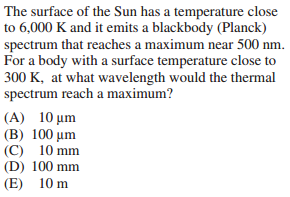
But some questions will supply you with a diagram or two:
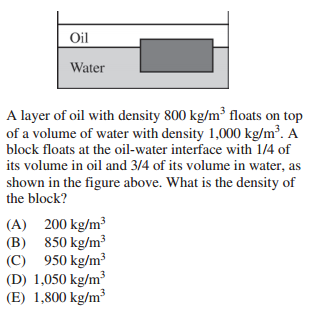
And others will focus on coordinate systems, graphs, or other forms of data representation:
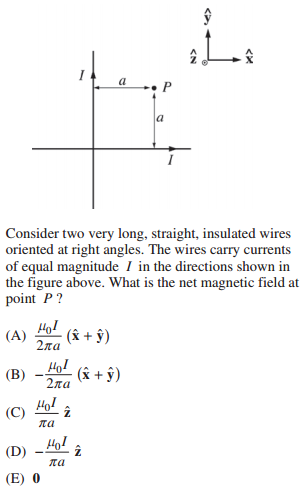

4 Essential Tips for Studying GRE Physics
Now that you know what to expect on the Physics GRE, it’s time for you to buckle down and begin studying for it! Below are our top four study strategies for GRE physics.
#1: Review Undergrad Concepts
As I mentioned previously, GRE physics questions tend to target topics studied in the first three years of undergrad physics. So if you have a major or a minor in physics, most of your studying for the GRE should consist of reviewing basic topics.
Don’t believe me? In a 2009 article for Discover, former member of the GRE Physics Committee of Examiners John Conway remarked the following: “My first piece of advice to students studying for [the Physics GRE] is to focus on reviewing the textbook from your freshman introductory physics course … I have found that only a small fraction of the items on the GRE are actually from upper-level topics.”
Basically, you’re more likely to score highly on the exam if you dedicate a lot of time to reviewing elementary physics concepts rather than to learning upper-level concepts like stat mech or quantum.
And the best way to review what you’ve learned? Simply reread your old undergrad physics textbooks. If you don’t have any textbooks on hand, try searching for (used) ones at your local library (best if it’s a university library) or on websites such as eBay and Amazon.
#2: Brush Up on Formulas
Reviewing major physics formulas can help you feel more prepared and confident on test day. In terms of resources, the Harvard Society of Physics Students has put together a compilation of common GRE physics formulas. You can also check out physicist Steve Byrnes’ GRE study sheet.
But you don’t have to memorize all major physics formulas. According to the Stanford Society of Physics Students, “you’re not allowed to have any notes or references [on the Physics GRE]. Some people interpret this as a requirement to memorize every formula one can get one’s hands on, but this isn’t necessarily the case.”
In the end, what’s more important is being able to correctly apply the formulas and laws listed in the Table of Information given to you at the beginning of the test (see example below). So don’t overload your brain trying to memorize tons and tons of formulas when you really don’t have to!
The Table of Information you receive will provide you with things such as formulas, physical constants, conversion factors, etc., to use on the test. Here is an example:
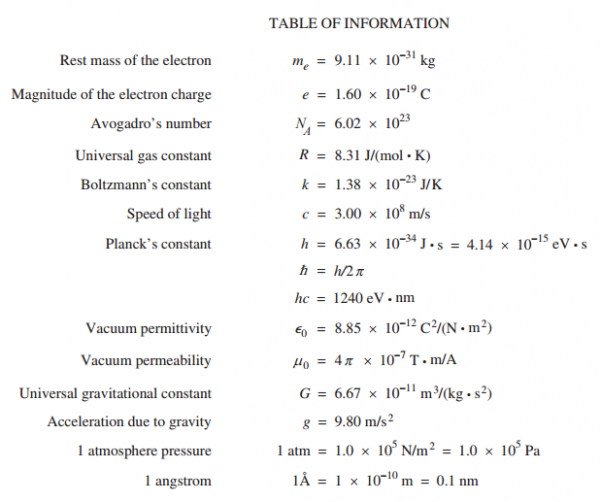
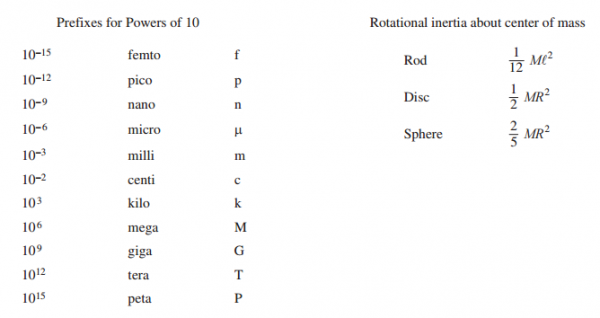
#3: Use Flashcards
Once you’ve reviewed the fundamentals of physics, use flashcards to drill the concepts you’re studying, particularly the more challenging ones. In the realm of physics, flashcards can help you memorize special terminology, laws, formulas, and other major concepts. And the best part is that flashcards are completely customizable — not to mention a cinch to make!
Want to improve your GRE score by 7 points? We have the industry's leading GRE prep program. Built by world-class instructors with 99th percentile GRE scores, the program learns your strengths and weaknesses through machine learning data science, then customizes your prep program to you so you get the most effective prep possible.
Try our 5-day full access trial for free:
Feel free to create your own set of flashcards using either note cards or digital cards. For digital cards, I recommend downloading a free software called Anki, which uses spaced-repetition software (SRS) to test you more often on cards you’re less familiar with.
If you’re opting for note cards, be sure to use the waterfall method, described in detail in our article on GRE vocab.
#4: Take Official Practice Tests
In addition to studying GRE physics concepts, you’ll also need to acquaint yourself with how these concepts are tested, and there’s no better way to do so than with official practice tests.
At present, there are six official Physics GRE practice tests available online, all of which are completely free! The only major downside is that some of the tests are quite old (the oldest dates back to 1986). But the form and content of the exam haven’t changed much over the years, so all of the practice tests should be equally useful.
Go to the ETS website to download the current Physics GRE practice book. Older exams can be accessed through Ohio State University.
You can also download any of the six practice tests using the direct links below:
- 1986 Physics GRE
- 1992 Physics GRE
- 1996 Physics GRE
- 2001 Physics GRE
- 2008 Physics GRE
- 2013 Physics GRE

Top 3 Test-Taking Tips for the Physics GRE
Unfortunately, dedicating all of your time to studying won’t guarantee you an excellent Physics GRE score — you must know what to expect on test day, too! In this section, I give you our top three tips for attacking GRE physics questions with confidence.
#1: Use Your Time Wisely
Because the Physics GRE is a nearly three-hour-long exam testing you on around 100 questions, aim to spend less than two minutes per question on average. This isn’t a hard-and-fast rule since certain questions will obviously take more or less time than others.
Generally speaking, though, avoid spending more than three or four minutes on any one question. If you get stuck, either skip the question or use the process of elimination to make an educated guess (see tip #3 below).
Furthermore, be sure you’re correctly marking your answers on the answer sheet as you progress through the exam. Some people prefer marking their answers in the test booklet and then later copying all of their answers to the answer sheet. But I don’t recommend this tactic for the Physics GRE, as it can be easy to overestimate how much time you have left. Worst case scenario, if time runs out, you could be left with a totally blank answer sheet!
#2: Do the Easy Questions First
Another solid method for approaching GRE questions is to answer only the easy questions first. More specifically, you’ll approach each question one at a time, solving only the ones you can work through quickly and accurately, all the while marking any difficult questions to return to later.
Ideally, easy GRE physics questions shouldn’t take you more than a minute or so. Once you finish all of the easy ones, you can then use your leftover time to go through the test once more from the beginning, focusing this time on the more difficult questions you marked for review.
#3: Only Answer the Questions You (Almost) Know
Unlike the general GRE, you’ll lose points for guessing incorrectly on the Physics GRE, so it’s imperative you answer every question you know or almost know — but avoid answering any questions you’re absolutely clueless about.
For the Physics GRE, your raw score is the number of questions you get right minus one-fourth the number of questions you get wrong. You do not lose any points for unanswered questions. So if you’re completely stuck on a question, in the end it’s best to just leave it blank. That way, the answer won’t count against you (although it won’t raise your score either).
If you can eliminate at least three answer choices, I strongly recommend making an educated guess. If you can only eliminate one or two answer choices, consider other factors, such as how confident you feel about your guess and whether there are others ways you can approach or solve the question.
Even if you can only eliminate one answer choice, your chance of answering that question correctly still goes up! So don’t be scared to guess on the exam, just as long as you do so wisely.

Recap: Physics GRE
Only those who intend to study physics or a physics-related field in grad school should take the Physics GRE. Though most physics programs require applicants to submit Physics GRE scores, some do not require them (but will usually consider them if submitted).
At a little less than three hours long, the Physics GRE is a paper-delivered exam offered three times a year and consisting of approximately 100 questions. GRE physics questions test a variety of concepts:
- Classical Mechanics (20 percent)
- Electromagnetism (18 percent)
- Quantum Mechanics (12 percent)
- Atomic Physics (10 percent)
- Thermodynamics and Statistical Mechanics (10 percent)
- Optics and Wave Phenomena (9 percent)
- Specialized Topics (9 percent)
- Laboratory Methods (6 percent)
- Special Relativity (6 percent)
For quality Physics GRE practice, be sure to do the following:
- Review undergrad concepts using undergrad physics textbooks
- Brush up on major formulas and know how to use the Table of Information on the exam
- Make flashcards
- Take official practice tests (which are available for free online!)
Finally, here are our top strategies for acing the exam:
- Use your time wisely by spending less than two minutes on average per question
- Solve the easy questions first and mark any difficult ones for later
- Answer only the questions you know or can make educated guesses for
Knowing everything you can know about the Physics GRE is the first step to getting the score you want. As long as you use the tools and tips we’ve given you above, I guarantee you’ll be flaunting an acceptance letter in no time!
What’s Next?
Got questions about GRE subject tests? If you’re having trouble figuring out whether you need to take a GRE subject test, we’ve got the ultimate guide for you.
Need help registering for a GRE subject test? Follow our step-by-step guide to GRE registration today. For all other questions, refer to our in-depth GRE FAQ.
About to take the general GRE, too? Don’t sweat it! Check out our top 34 GRE tips and strategies, and take a look at our picks for the best GRE prep books of 2016.
Ready to improve your GRE score by 7 points?
We've written a eBook about the top 5 strategies you must be using to have a shot at improving your GRE score.
Download it for free now:


Comments are closed.